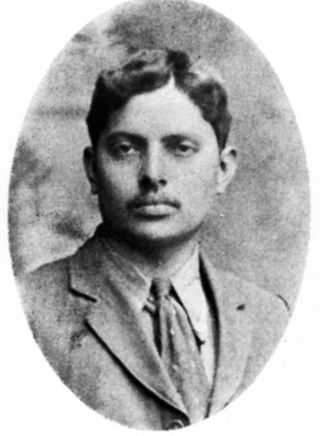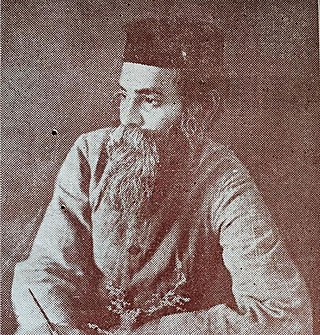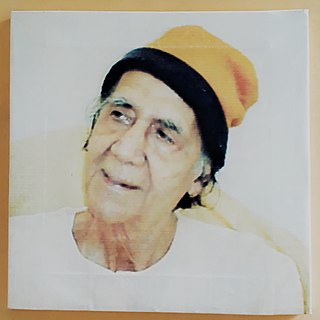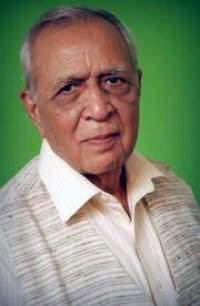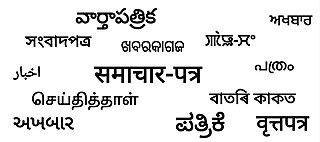Works
Dinkar Joshi has written more than 156 books in his six decade long literary career. He has written 45 novels on social, historical, rural and ancient subjects. He has written many essays and topical sketches. He has edited and translated several books in Gujarati. He has done extensive study and research on Krishna and Mahatma Gandhi. [5] He has studied the Ramayana, Mahabharata, Vedas and Upanishads and has written extensively on these subjects. [2] [6] He has written several biographical novels including on poet Narmad; Harilal Gandhi, the eldest son of Mahatma Gandhi; Muhammad Ali Jinnah, Rabindranath Tagore, Gautam Buddha, Sardar Patel and Lev Tolstoy. [7] Some of his novels have been adapted into Gujarati films. [1]
His novel Prakash no Padchhayo, written on the life of Harilal Gandhi, has been dramatized in English, Gujarati, Marathi, Hindi and several Indian languages. [2] [8] [9] [10] This adapted play by Feroz Abbas Khan, Mahatma versus Gandhi [11] was staged during the commemorative function held to celebrate Gandhi's anniversary at Columbia University in New York, organised by the Indo-American Arts Council.
His novels include Door Door Aara (1963), Jane Ajane (1963), Tan Zankhe Man Roy (1965), Matsyavedh (1966), Adithan Roop (1967), Shesh - Ashesh (1969), Aganpathari (1972), Tarasyan Pagalan Tran (1974), Yakshaprashna (1974), Asahya (1976), Satyano Chahero (1977), Khelo Re Khel Khurshina (1978), Kankuna Suraj Aathamya (1979), Suraj Dhima Tapo (1981), Barafni Chadar (1981), Sachan Motino Charo (1982), Aa Pag Nicheno Rasto (1982), Agiyarmi Disha (1982), Aapane Kyank Malyan Chhie (1983), Triji Aankh (1983), 35 Up 36 Down (1983), Garvun Roop Varvi Chhaya (2005), Ek Tukado Aakashno (1984) based on life of Narmad, [12] Radhani Vedana (1984), Saranama Vinanun Ghar (1986), Jamana Pagno Angutho (1987), Sarpsatra (1987), Shyam Ekvar Aavone Aangane (1988), Prakash no Padachhayo (1988) based on life of Harilal Gandhi, Kale Surajne Kahejo Ke (1989), Kurusabha (1990), Alpaviram (1991), Vastraharan (1992), Amrutyatra (1994), Kalpurush (1995), Ekada Vagarna Mindan (1997), Sami Sanjna Padachhaya (1999), Dariyathi Dariya Sudhi (2001), Pratinayak (2002), Amrutpanthano Yatri (2003), Ahin Koi Nathi (2005), Prashnapradeshni Pele Paar (2008), Ayodhyano Ravan Ane Lankana Ram (2010), Mahamanav Sardar (2014), Gaikal Vinani Avatikal (2016). He coauthored novel Parivartan (1991). [13]
His short stories collections are Anradhar (1964), Vanpravesh (1965), Tarafadat (1969), Ek Lawaris Shab (1974), Ek Vaheli Sawarnun Sapanun (1980), Nam Badalvani Ramat (1986), Dinkar Joshini Shreshtha Vartao (1988), Bandhi Muththino Khalipo (1990), Nava Varasnun Panchang (1995), Ek Hato Manas (1997), Sarvalani Badbaki (2003), Vagadanu Phool (2012), Ekvar Evun Banyun (2016). [13]
He edited several works including Yaad (1954-64 ni Pratinidhi Varatao) (1987), Kavyarasaswad (1987), Venibhaino Varta Vaibhav (1991), Rangnagarno Rasiyo Nagar (a memorial book on Venibhai Purohit, 1991), Saravaiyun (commemorative book on centenary of Chandulal Selarka, 1992), Aambavadiyun (articles of Swami Anand, 1996), Amaratvel (articles of Swami Anand, 1996), Ugamani Dishano Ujas (Letter correspondences of Swami Anand, 1996), Dhodhamar (Letter correspondences of Swami Anand, 1996), Krushnacharitra (Bankimchandra, 2000), Ekakshari Shabdakosh (2003), Samay Chintan (articles of Kakasaheb Kalelkar, 2008), Spandan (articles of Bhagwatikumar Sharma, 2011) and twenty volumes of Mahabharata (2010) translated into Gujarati. [13]
He translated Punjabi Ekanki in 1978. His other works are, Tulasi Is Sansar Men (1986), Tachali Aangalie Govardhan (1989), Manas Taran Roop Anek (1991), Ek Najar Aa Taraf (1992), Krushnam Vande Jagadgurum (1990), Mahabharatma Manavdarshan (1991), Ardhya (1994), Abhishek (1994), Aachaman (1994), Anjali (1994), Archana (1994), Mara Vidhya Guruo (1994), Tulsidal (1995), Darbhasan (1997), Nadabrahma (1997), Kalpataru (1997), Halvu Ful Aakash (1997), Satya Taraf Do Jatun Asatya (1997), Dharatinum Sarnamun (1997), Bodhivruksha (1997), Mahabharatman Matruvandana (1997), Mahabharatman Pitruvandana (1997), Suranjo Chhadidar (1997), Mahabharat : Ek Darshan (1999), Pratah Vandana (1999), Paramno Panth (1999), Adrashyani Aaradhana (1999), Dishaoni Pele Paar (1999), Ramayanman Patravandana (2001), Mahalakshmina Mandirman (2001), Dinkar Joshini Vicharyatra (2004), Latamandap (2004), Parijat (2004), Bharatiya Sanskrutina Sarjako (2004) with Yogesh Patel, Shri Krushnanun Sarnamun (2005), Gandhino Yagna Dandiyatra (2005), Mumbaina Vikasman Gujrationun Yogadan (2005), Ramayan, Mahabharat, Bhagawat Chintan Ane Manan (2006), Chakrathi Charkha Sudhi (2006), Sukhanun Sarnamun (2006), Akshrani Aakashganga (2007), Dikari Etle Tulsikyaro (2007), Tyare Ane Atyare - 1947 to 2007 (2008), Ame Ane Aapane (2009), Manasnun Kai Kahevay Nahin (2009), Manase Mangelun Vardan (2009), Mrutyu Aa Paar Ke Pele Paar (2009), Najaronajar (2009), Hun Mane Joun Chhun (2009), Kalni Kasotie Gandhijini Geeta "Hind Swaraj" (2009), Shadaripu (2011), Shunyama Shabda Tun (2012), Sohamano Suryasta (2012), [13] Gandhi Sardar ane Jinha Vyaktidarshan (2013), Matini Sugandh (2013) and X-ray Apana Sahuno (2015).
His several works are translated into other languages totaling fifty eight books including in English, German, Kannad, Marathi, Malayalam, Telugu, Tamil, Bangala, Oriya and Hindi languages. [2] [14] His books translated into English are Glimpses Of Indian Culture, An Eternal Journey, Quaid Azam Mohmmad Ali Jinnah, Mahatma Vs Gandhi, Sardar, The Sovereign Saint.


